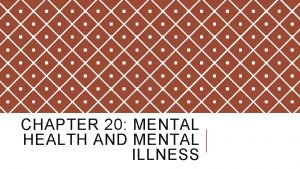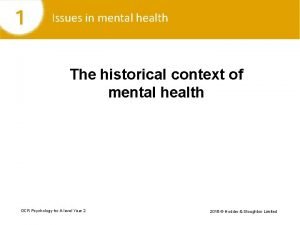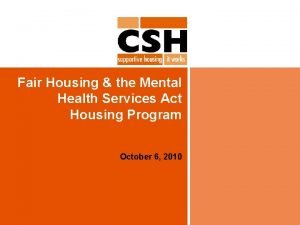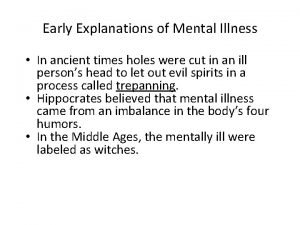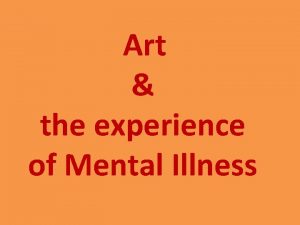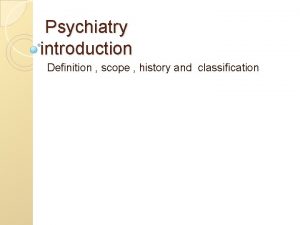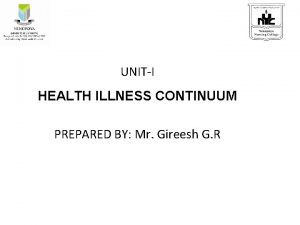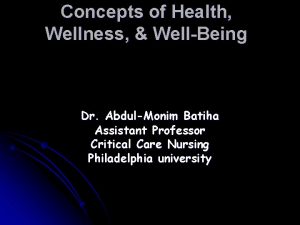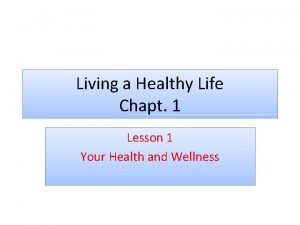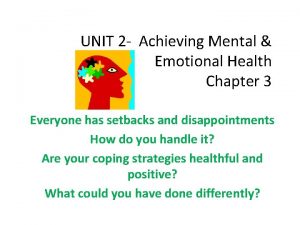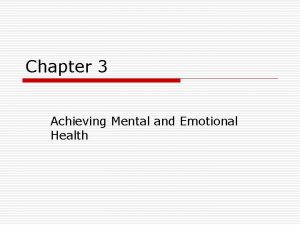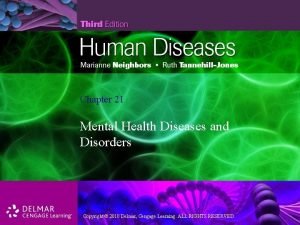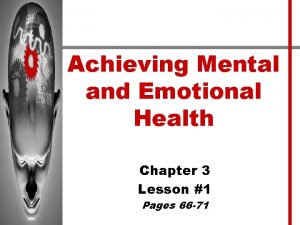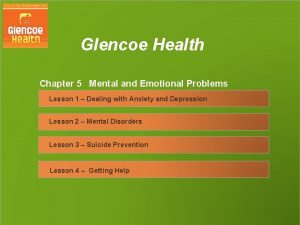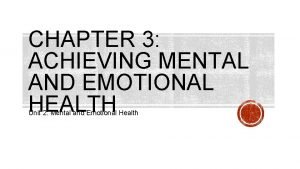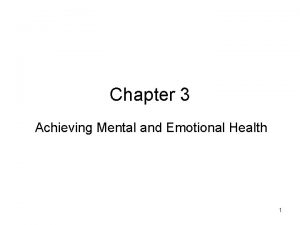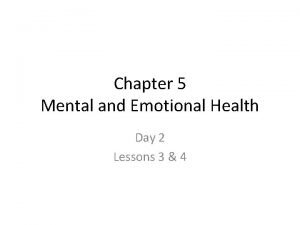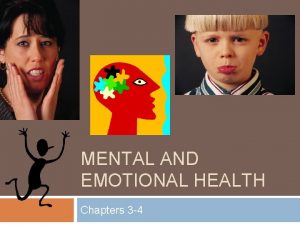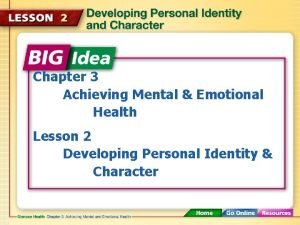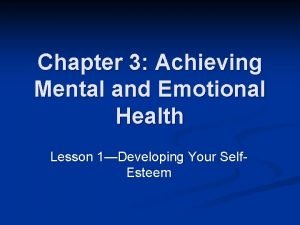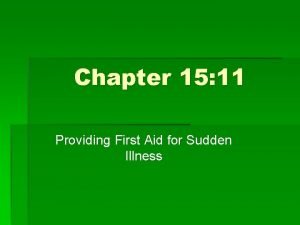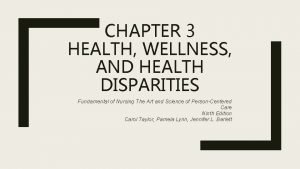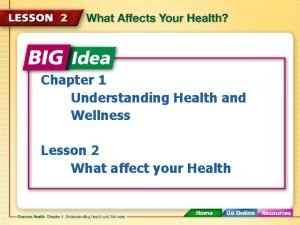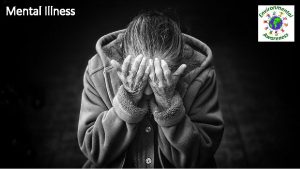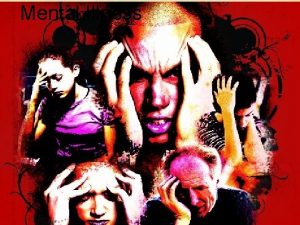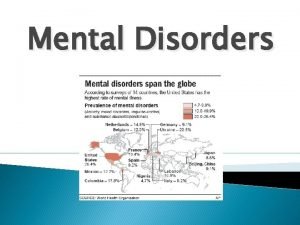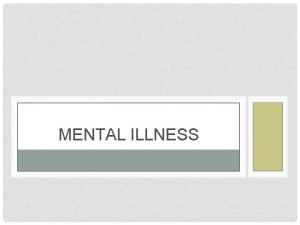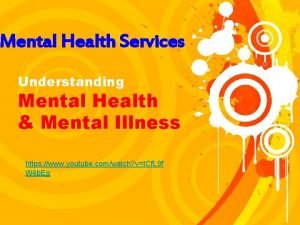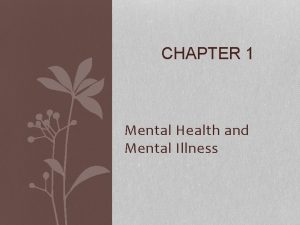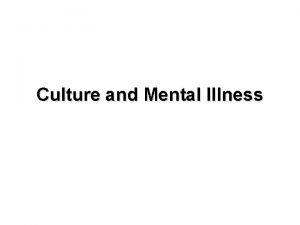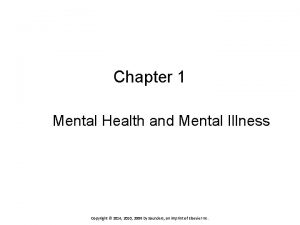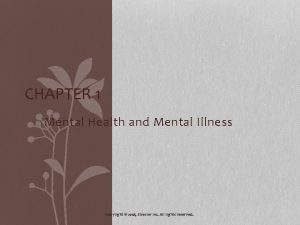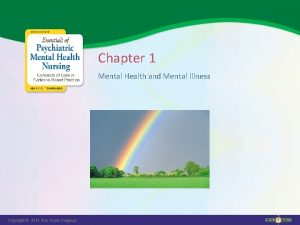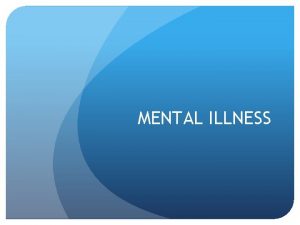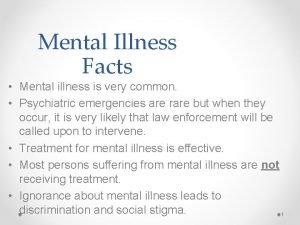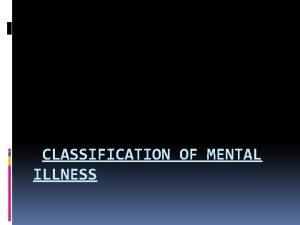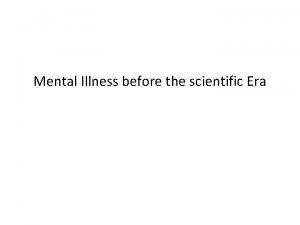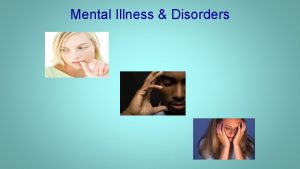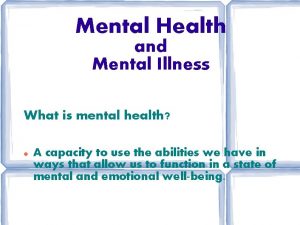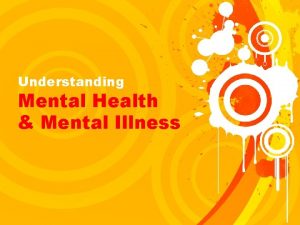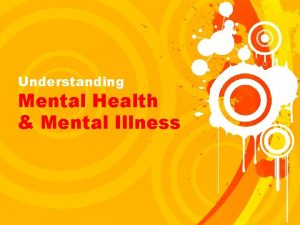Chapter 01 Mental Health and Mental Illness Copyright
































- Slides: 32

Chapter 01 Mental Health and Mental Illness Copyright © 2011 Wolters Kluwer Health | Lippincott Williams & Wilkins

Mental Health Defined • Complete state of health when physical, mental, and social well-being are intact • Mentally healthy have the ability to adapt to stressors in an acceptable way • A “state of well-being in which the individual realizes his or her own abilities, can cope with the normal stresses of life, can work productively and fruitfully, and is able to make a contribution to his or her community” (NIMH, 2004) Copyright © 2011 Wolters Kluwer Health | Lippincott Williams & Wilkins

Mental Illness Defined • DSM-IV-TR: “clinically significant behavioral or psychological syndrome or pattern that occurs in an individual and that is associated with present distress (e. g. , a painful symptom) or disability (impairment in one or more important areas of functioning)” • Unable to carry out daily necessities (cooking, bathing, dressing, etc. ) Copyright © 2011 Wolters Kluwer Health | Lippincott Williams & Wilkins

Cultural, Ethnic, and Religious Influences • Cultures provide variances in perceiving, coping with, and managing mental health issues • Examples – Turn to faith healers – Deny that a problem exists – View symptoms as punishment for wrongdoing • What makes up a culture? Copyright © 2011 Wolters Kluwer Health | Lippincott Williams & Wilkins

Culture • Common heritage and a set of beliefs, norms, values, and behaviors that are unique to each • Cultural identity – Common language – Family customs – Country of origin – Religious and political beliefs – Sexual orientation – Gender Copyright © 2011 Wolters Kluwer Health | Lippincott Williams & Wilkins

Other Beliefs • Mental symptoms are related to: witchcraft, demon possessions, or substance abuse – Can be eliminated by remedies such as folk customs, magic, traditional medicines, herbs Copyright © 2011 Wolters Kluwer Health | Lippincott Williams & Wilkins

Defining Stress • A condition that results when a threat or challenge to our well-being requires us to adapt or make an adjustment – Distress • Response to a threat or challenge – harmful to one’s health – Eustress • Positive and motivating, shows confidence in the ability to master a challenge or stressor – “Fight or flight” response Copyright © 2011 Wolters Kluwer Health | Lippincott Williams & Wilkins

Fight-or-Flight Response • Surge of adrenal hormone epinephrine or adrenalin into the bloodstream. • Provides energy or instant strength to either fight or run away from a danger or threat • Usually reversed to relaxation when the danger has past Copyright © 2011 Wolters Kluwer Health | Lippincott Williams & Wilkins

Common Signs & Symptoms of Stress • Physical Symptoms – ^ HR, BP, Resp, palpitations, Abdominal Cramping, N/V, Diarrhea, Headaches, Insomnia • Mental Symptoms – Lack of concentration and memory, inability to make decisions, forgetfulness, confusion • Emotional Symptoms – Anxiety, Nervousness, Irritability, Frustration and worry • Behavioral Symptoms – Fidgeting, Nail-biting, Smoking/Drinking, Yelling, Violence Copyright © 2011 Wolters Kluwer Health | Lippincott Williams & Wilkins

Defining Anxiety • Built-in response to a real or perceived threat to our wellbeing • A feeling of apprehension, uneasiness, or uncertainty that occurs in response to a real or perceived threat of an unknown source • Four levels Pg. 6 Table 1. 3 – Mild - Motivated – Moderate – Decreased Attentiveness – Severe – Loses sight of whole picture – Panic – Unaware of reality Copyright © 2011 Wolters Kluwer Health | Lippincott Williams & Wilkins

Contributing Factors to Stress and Anxiety • External stressors Pg. 7 Box 1. 2 – Adverse aspects of the environment – Abusive relationship, poverty-level living conditions • Internal stressors – Physical • Chronic illness or terminal condition – Psychological • Continued worry about financial burdens or disasters Copyright © 2011 Wolters Kluwer Health | Lippincott Williams & Wilkins

Effect of Stress on Self • Continued stress can eventually pose as a threat to one’s health • We view external circumstances as the cause of our stress, but in reality, we create most of our own stress by choosing to make ourselves miserable and upset • Anticipating the worst possible outcome for situations Copyright © 2011 Wolters Kluwer Health | Lippincott Williams & Wilkins

Coping with Stress and Anxiety • Four categories: adaptive, palliative, maladaptive, and dysfunctional. • Positive outcome – Adaptive coping – successful management – Palliative coping – recurrent stressors • Negative outcome – Maladaptive coping – unsuccessful attempts made – Dysfunctional coping – no attempt to solve problem • Discuss examples of both types of coping mechanisms Copyright © 2011 Wolters Kluwer Health | Lippincott Williams & Wilkins

Adaptive Coping Strategies • Reframing (restructuring thinking) Pg. 8 Table 1. 4 • Positive self-talk, humor • Assertiveness training • Problem-solving and communication skills • Relaxation techniques, self-care • Support systems • Faith in spiritual power and in yourself Copyright © 2011 Wolters Kluwer Health | Lippincott Williams & Wilkins

Psychological Crisis • A state of disorganization during which time usual coping strategies fail • Total inability to control the situation and to function in daily activities • Individual feels helpless and lost • May result from – Unrealistic perception of a threatening event – Lack of a support system – Inadequate coping ability Copyright © 2011 Wolters Kluwer Health | Lippincott Williams & Wilkins

Crisis Intervention • Deal with the present situation; early intervention is best • Reduce anxiety level • Help client define the problem • Determine available support • Help client set realistic goals for resolution • Provide support and reassurance • Provide for client’s safety and security Copyright © 2011 Wolters Kluwer Health | Lippincott Williams & Wilkins

Case Application 1. 1 • Pg. 10 • How does Nathan’s problem demonstrate a crisis situation? • What is the first step of the interventions to help Nathan? Copyright © 2011 Wolters Kluwer Health | Lippincott Williams & Wilkins

Grief and Loss • Grief an emotional process of coping with a loss – May leave the person with a sense of emptiness, hopelessness, and detachment from the meaning that was previously found in life • Loss an actual/perceived change of relationship with lost person or object Copyright © 2011 Wolters Kluwer Health | Lippincott Williams & Wilkins

Types of Grief • Anticipatory grief – When expecting a loss in the near future • Conventional grief – Following a loss – Bereavement – adapting to a loss • May take days, weeks, years • Age-related concepts of loss – Pg. 11 Table 1. 5 Copyright © 2011 Wolters Kluwer Health | Lippincott Williams & Wilkins

Stages of Grief (Kubler-Ross) • Shock and denial – Want to avoid reality of the loss and act as if nothing has occurred or as though the lost object/person is still present • Anger and pain – Crying, expressions of self-blame, or guilt • Negotiation and bargaining – Attempt to postpone acceptance of loss • Withdrawal and depression – extends beyond 2 weeks • Acceptance and resolution Copyright © 2011 Wolters Kluwer Health | Lippincott Williams & Wilkins

Dysfunctional Grief • Failure to cope successfully with loss – Chronic sorrow – Contributing factors to unresolved grief • Socially unacceptable death • Missing person • Multiple losses • Ambivalent feelings toward the lost person • Guilt Copyright © 2011 Wolters Kluwer Health | Lippincott Williams & Wilkins

Case Application 1. 2 • Pg. 14 • What feelings might be responsible for Art’s symptoms? • How should the nurse respond to Art? • What stage of the grief process is Art likely experiencing? • What referrals may be appropriate for Art? Copyright © 2011 Wolters Kluwer Health | Lippincott Williams & Wilkins

Defining Anger • An emotion triggered in response to threats, insulting situations, or anything that hampers the intended action of an individual • May be directed at an individual, group, or self • Builds into bitterness • People who are easily frustrated angered usually hae a history of being irritable, touchy, and quick-tempered from an early age. Copyright © 2011 Wolters Kluwer Health | Lippincott Williams & Wilkins

Defining Violence and Abuse • Violence an intense feeling toward an individual that starts with verbal or physical threats and assaults that victimize the person • Abuse compelling destructive action against an individual against his or her will – May be physical, sexual, verbal, emotional, or neglectful Copyright © 2011 Wolters Kluwer Health | Lippincott Williams & Wilkins

Managing Anger • Recognize the origin of emotional response – Allows us to be in touch with why we respond as we do • Engage in physical activity – Energy is utilized constructively • Stand up for rights, beliefs, or values – Assertiveness – respect for oneself • Talk with someone who will listen • Learn to forgive Copyright © 2011 Wolters Kluwer Health | Lippincott Williams & Wilkins

Question • Tell whether the following statement is true or false. Stress can help people function at optimal levels. Copyright © 2011 Wolters Kluwer Health | Lippincott Williams & Wilkins

Answer • True • Rationale: Stress is a part of everyday living. Mild stress can motivate and propel people toward accomplishment and success. Copyright © 2011 Wolters Kluwer Health | Lippincott Williams & Wilkins

Question • Grief that comes when one is expecting a loss in the near future is called A. Conventional grief B. Dysfunctional grief C. Anticipatory grief D. Chronic sorrow Copyright © 2011 Wolters Kluwer Health | Lippincott Williams & Wilkins

Answer • C. Anticipatory grief • Rationale: Anticipatory grief is a response in individuals or families that occurs when a loss is expected in the near future. It can be a helpful concept for nurses working with terminally ill patients and patients who are anticipating the loss of a body part or a change in body functioning. Copyright © 2011 Wolters Kluwer Health | Lippincott Williams & Wilkins

Question • According to Dr. Kubler-Ross, which stage is the first step of the grieving process? A. Anger B. Denial C. Acceptance D. Bargaining Copyright © 2011 Wolters Kluwer Health | Lippincott Williams & Wilkins

Answer • B. Denial • Rationale: In the first stage of grief, a person who has experienced a loss wants to avoid the reality of it and may act as if nothing happened. Denial allows a person time to gather coping strategies for the grieving process ahead. Copyright © 2011 Wolters Kluwer Health | Lippincott Williams & Wilkins

Copyright © 2011 Wolters Kluwer Health | Lippincott Williams & Wilkins
 Chapter 20 mental health and mental illness
Chapter 20 mental health and mental illness Mental health jeopardy
Mental health jeopardy Historical views of mental illness psychology ocr
Historical views of mental illness psychology ocr Fair housing act mental illness
Fair housing act mental illness Mental illness in ancient times
Mental illness in ancient times Personality disorder vs mental illness
Personality disorder vs mental illness Mark rothko mental illness
Mark rothko mental illness Catherine earnshaw mental illness
Catherine earnshaw mental illness Americanization of mental illness
Americanization of mental illness Thought broadcasting
Thought broadcasting Ksi depression
Ksi depression Health illness continuum
Health illness continuum Illness and wellness continuum
Illness and wellness continuum Health illness continuum
Health illness continuum Chapter 3 lesson 3 expressing emotions in healthful ways
Chapter 3 lesson 3 expressing emotions in healthful ways Chapter 3 achieving mental and emotional health
Chapter 3 achieving mental and emotional health Chapter 21 mental health diseases and disorders
Chapter 21 mental health diseases and disorders Chapter 3 achieving mental and emotional health answers
Chapter 3 achieving mental and emotional health answers Chapter 5 lesson 3 health
Chapter 5 lesson 3 health Chapter 3 mental and emotional health answer key
Chapter 3 mental and emotional health answer key Chapter 3 achieving mental and emotional health
Chapter 3 achieving mental and emotional health Emotional health defintion
Emotional health defintion Chapter 15 achieving mental and emotional health
Chapter 15 achieving mental and emotional health Chapter 3 mental and emotional health
Chapter 3 mental and emotional health Chapter 3 achieving mental and emotional health
Chapter 3 achieving mental and emotional health Chapter 3 achieving mental and emotional health
Chapter 3 achieving mental and emotional health Chapter 3 achieving mental and emotional health
Chapter 3 achieving mental and emotional health Chapter 3 achieving mental and emotional health
Chapter 3 achieving mental and emotional health Chapter 15 achieving mental and emotional health
Chapter 15 achieving mental and emotional health Chapter 17 providing first aid
Chapter 17 providing first aid Chapter 16:11 providing first aid for sudden illness
Chapter 16:11 providing first aid for sudden illness Chapter 3 health wellness and health disparities
Chapter 3 health wellness and health disparities Glencoe health chapter 1 understanding health and wellness
Glencoe health chapter 1 understanding health and wellness
